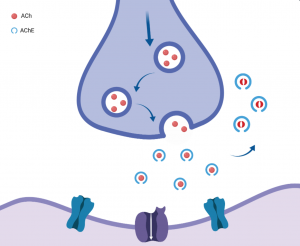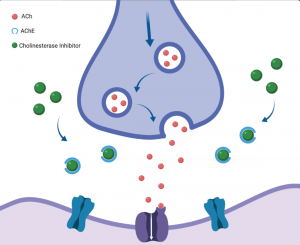7.2.1 – Cholinesterase Inhibitors
Acetylcholine is a vital neurotransmitter in the body which is responsible for many important functions such as motor skills, short-term memory, and the capacity to learn new information. In a cholinergic synapse, acetylcholine is released into the synaptic cleft from the presynaptic neuron to bind to the postsynaptic membrane and propagate action potentials. This action is important in specific areas of the brain such as the hippocampus where messages between neurons are used to consolidate memories. However, in patients with Alzheimer’s disease, acetylcholine levels are reduced and cholinergic neurons in the brain are lost. The enzyme acetylcholinesterase, which is responsible for the breakdown of acetylcholine, has been shown to be present in higher concentrations in patients. In a normal brain, acetylcholinesterase is important to maintain neurotransmitter homeostasis and to stop an action potential from propagating further. However, in tandem with cholinergic neuron loss, the increased level of the enzyme drastically reduces the concentration of acetylcholine in the diseased brain. The loss of acetylcholine results in severe memory loss and several other neuropsychiatric symptoms that are typical of Alzheimer’s. Interestingly, previous studies have shown that acetylcholinesterase can actually directly accelerate the aggregation of amyloid beta in the brain and thus accelerate plaque formation that leads to the deleterious effects associated with Alzheimer’s disease. Acetylcholinesterase and growing amyloid fibrils bind to each other via hydrophobic interactions, which leads to the acceleration of amyloid plaque growth. These plaques are responsible for neurotoxicity and cell death, causing symptoms to progress and become more severe.
A series of drugs known as cholinesterase inhibitors were one of the first classes of drugs developed to treat Alzheimer’s disease, and are widely considered to be the first treatment option for patients with the disease. Cholinesterase inhibitors are responsible for the breakdown of the acetylcholinesterase enzyme, which allows for acetylcholine to aggregate in the brain and once again interact with receptors on the other side of the postsynaptic cleft. The three most commonly prescribed cholinesterase inhibitors include donepezil, rivastigmine, and galantamine. They are all competitive, meaning that they out-compete acetylcholine to bind to acetylcholinesterase, but the reversibility of their action is dependent on the specific drug – for example, rivastigmine is considered to be irreversible, while donepezil and galantamine are considered reversible. It is important to note that this class of drugs does not directly increase cognitive function – rather, they act to prevent a more rapid cognitive decrease in the diseased brain. Though effective, their effects are typically only moderate. In addition, cholinesterase inhibitors work best when treatment is started early. In a disease such as Alzheimer’s, this is often difficult as early diagnostic tools are limited.
Many individuals prescribed high doses of these drugs experience side effects affecting the gastrointestinal system such as vomiting and diarrhea. Perhaps more severely, people using cholinesterase inhibitors have also been noted to experience fainting spells and low heart rate along with increased need for pacemakers. Though cholinesterase inhibitors are the most commonly prescribed pharmaceutical treatment for Alzheimer’s disease, the negative gastrointestinal and cardiac side effects must be weighed against only a modest augmentation in cognitive decline.


